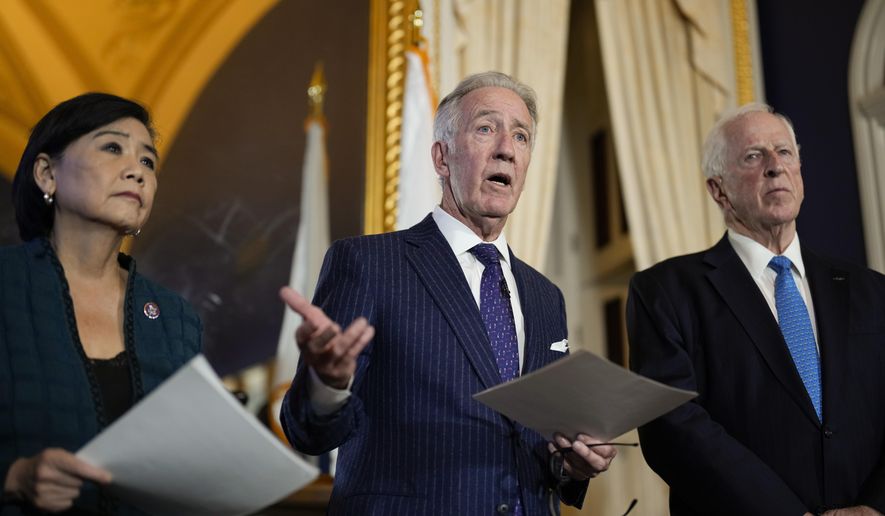ANALYSIS:
As Republicans work to expose massive amounts of fraud in pandemic assistance programs, Democrats are responding with a feverish rearguard defense, saying that whatever the level of waste, millions of people were saved by the government’s money.
Democratic lawmakers said they fear a focus on fraud will sour the public on government spending and make it tougher to offer another round of assistance in a future crisis.
Rep. Loretta Sanchez of California recounted the story of a constituent woman who used benefits to keep the heat on for her dying mother. Rep. Richard Neal read a letter from a Massachusetts woman who said the unemployment benefits and stimulus checks “saved our family.”
Rep. Judy Chu, California Democrat, said unemployment money helped a mother of three “stay afloat.”
“Overwhelmingly the American economy rebounded because of what we did,” said Mr. Neal, ranking Democrat on the House Ways and Means Committee.
He was speaking at a hearing Wednesday, called to examine fraud in the pandemic unemployment benefits program. A week earlier, the Oversight and Accountability Committee examined fraud in the two big pandemic loan programs run by the Small Business Administration.
Both hearings showcased the new GOP House majority’s interest in highlighting the waste and fraud that plagued all of the programs.
“Every dollar going to fraud is a dollar that did not go to those that needed it,” said Rep. Jason Smith, Missouri Republican and chairman of the Ways and Means Committee.
Democrats, though, say the effort is misguided.
They said Wednesday’s hearing, which saw testimony from the government’s leading investigators, should have featured people who were sustained through the pandemic by government assistance.
And they defended the decision to sacrifice accuracy in favor of speed in getting cash out the door.
“Was it perfect? No. But it kept families fed, it kept families housed,” Ms. Chu said.
Mr. Neal said the current estimate of fraud in the pandemic unemployment program, roughly $60 billion, is just 7.1% of the $850 billion or so that was allocated.
But experts said that was a preliminary figure and it will take years to know the full extent of the fraud — if it is ever known.
Michael Horowitz, who leads a consortium of inspectors general tasked with pursuing fraud cases, said it will be particularly tricky to track money that flowed to criminal syndicates overseas.
One outside analyst has said fraud in the unemployment program could run as high as $400 billion, while others place it between $200 billion and $250 billion.
The fraud usually started with stolen identities, which were then run through state unemployment assistance programs. Larry D. Turner, inspector general at the Labor Department, said stolen Social Security numbers can be bought on the Dark Web for 5 cents apiece.
While many bogus applications were weeded out, many more were approved — particularly in the early months, when agencies were shoveling money out based on applicants’ self-certification.
Mr. Turner said they’ve found one individual who filed unemployment claims in 42 different states.
Clawing back the money is difficult — particularly the cash that went abroad.
And states have already begun waiving overpayments, in some cases ignoring potential indicators of fraud.
Several Republicans said the incentives are skewed. The federal government funded the extra unemployment benefits, but they were administered by the states.
That means the states have less incentive to try to recapture the funds that were wrongly paid out.
Mr. Turner said Labor Department officials hope to change that by offering a 5% bounty paid back to the states on fraud they do sniff out.
Democrats suggested there were bigger fraud targets for Congress to worry about than the pandemic programs.
Rep. Earl Blumenauer, Oregon Democrat, pointed to the “tax gap,” or the amount of money the IRS believes it’s owed but not paid by taxpayers.
“I hope there is still an air of indignation about the far greater source of lost revenues from primarily rich people who forget to declare their income,” Mr. Blumenauer said. “That is even more important — and this is an ongoing loss of revenue, $500, $600 billion a year that’s lost.”
• Stephen Dinan can be reached at sdinan@washingtontimes.com.




Please read our comment policy before commenting.